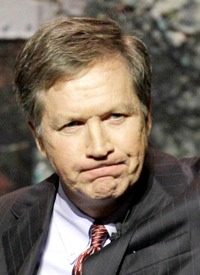
The union-related proposal in Ohio would only limit some of the collective-bargaining privileges of government workers in the state; it would not affect private-sector unions. Basically, public-sector employees would still be allowed to collectively negotiate for pay, hours, and some working conditions, but not health or pension benefits.
However, unlike the bill that recently passed in Wisconsin, the measure in Ohio would also apply to police, firefighters, and safety employees. In total, it would affect about 350,000 government-sector workers.
The legislation would also establish penalties, including fines and possible jail time, for public-sector employees who participate in illegal strikes. Striking by government workers in Wisconsin was already prohibited, though socialists and union agitators are pushing for an illegal general strike there.
Additionally, the Ohio bill would mean that individual merit, as opposed to union dictates, would play a larger role in decisions related to salary increases. Some minor changes in vacation and sick-leave policies would be adopted, too, while government workers would be forced to contribute more to their health-insurance policies and pension plans.
The state Senate passed the union bill 17 to 16 earlier this month, with all of the votes in favor of the legislation coming from the GOP. Six Senate Republicans, however, voted against the bill.
Analysts believe the proposal will pass soon in the state House of Representatives as well, where Republicans also have a majority. Hearings are ongoing, however, and Democrats are putting up a fight.
The Governor has already expressed his support for the bill, so it is assumed that he will sign it if and when it reaches his desk.
Unlike in Wisconsin, having the Democrats flee the state would do nothing to slow down the proposals. But if the collective-bargaining legislation is eventually passed, Democrats, whose campaigns are heavily financed by unions, are already threatening to repeal it.
One idea being contemplated by the bill’s opponents would force the state to hold a referendum that could allow voters themselves to repeal it. However, the effort would be tough — a petition with more than 230,000 signatures would need to be delivered by early July.
In addition to limiting the power of government unions, Republicans in Ohio are also leading other efforts to cut the size and cost of government. Among the proposals being considered in order to save taxpayers money is the possibility of allowing the state to privatize and outsource some functions currently handled by the government. Those suggestions also have government-employee unions crying foul. "The more that we privatize jobs and cut budgets and take away from peoples' livelihoods, the harder it's going to be for working families to survive," complained Steve Kowalik of a local American Federation of State, County, and Municipal Employees union chapter.
Gov. John Kasich planned to release details of his spending-cut proposals at noon on March 15. “It will be a reform agenda in Ohio like no one has ever seen, all designed to get us in a good position," he said. After making the proposal public, the Governor said he would host a town hall meeting and answer questions from citizens and reporters.
Conservatives and Tea Party groups have held rallies at the Capitol and around the state to show support for the measures. But according to a Tea Party leader who sent an e-mail to supporters, government-union demonstrators have been using intimidation and deceptive, underhanded tactics such as those taught by socialist subversive Saul Alinsky — a “community organizer” who dedicated one of his books on seeking power by any means to Lucifer.
Like in Wisconsin, unions and their allies have also led a series of protests against the cuts and collective-bargaining limits. But the estimated crowd size of 8,500 during the biggest rally at the Capitol in Columbus paled in comparison to the size and ferocity of the demonstrations in Madison, which on some days included an estimated 70,000 protesters.
Newly elected Republican Gov. Kasich has been lambasted relentlessly by critics since taking office for a variety of issues — particularly by race agitators for not appointing enough “non-white” people to his cabinet. The Governor also sparked criticism when he called a police officer who wrote him a ticket an “idiot” several times, though he has since apologized for the remark.
Of course, government unions have been among the most vocal critics. Supporters, however, have been at least nominally pleased. During his election campaign, Kasich pledged not to raise taxes to cover the expected budget gap. So far, he has reportedly stuck to that promise — though not completely, since he has pushed to raise certain fees. His announcement on budget cuts, however, has his backers excited.
A poll from the University of Cincinnati suggests that Gov. Kasich’s approval rating is hovering around 40 percent among the general public, with about 47 percent disapproving. Just over a quarter of union members support him, the survey indicated.
The trend toward balancing state budgets partially by reining in the powers of government unions and the pensions and benefits of public-sector employees is spreading fast. Other states working on curtailing the collective-bargaining privileges of government-employee unions include Idaho, Indiana, Tennessee, Kansas, and more. Wisconsin’s measure recently became law after a fierce, month-long battle. But opponents of the budget-repair bill still insist that the “war” is not over.
State and local governments across America are facing massive budget problems, especially when considering unfunded government-employee pension liabilities estimated in the trillions. The shortfalls have prompted both tax hikes and budget cuts, but critics say broad reforms — including limiting the power of government-unions and their generous pension benefits, as well as slashing budgets — are necessary to truly address the crisis.
Photo of John Kasich: AP Images



